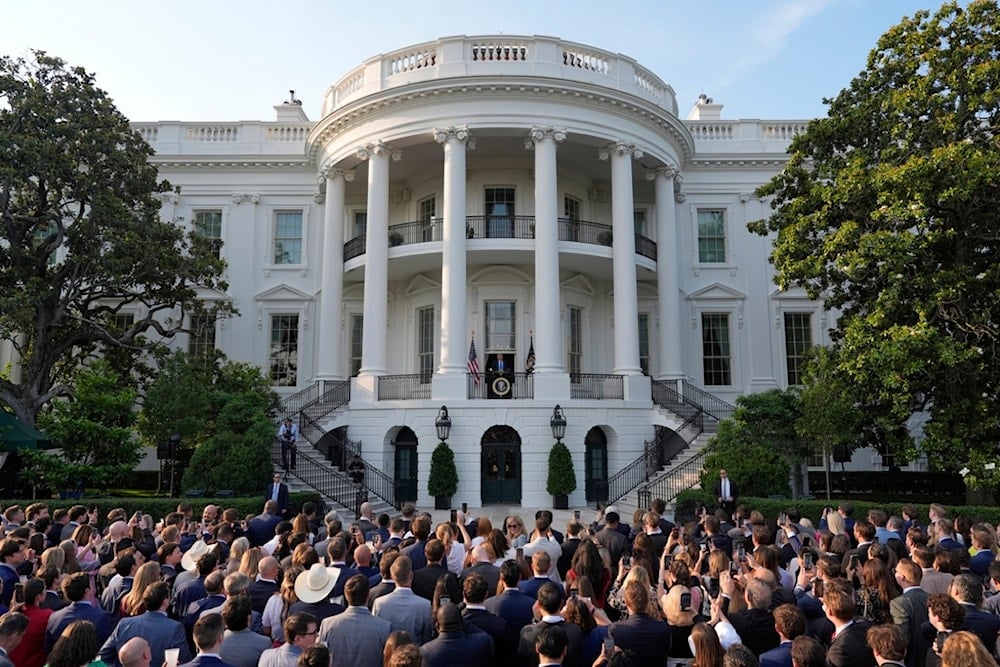Unvetted Starlink setup at White House sparks security fears: WashPo
Starlink's installation without prior cybersecurity clearance has prompted serious national security concerns over unmonitored data access and whistleblower warnings.
-

US President Donald Trump speaks during a summer soiree on the South Lawn of the White House, Wednesday, June 4, 2025, in Washington (AP)
Elon Musk's Starlink satellite internet was installed within the White House complex earlier this year without prior approval from official communications and cybersecurity teams, raising alarms over potential security vulnerabilities, The Washington Post reported Saturday.
According to three individuals with direct knowledge of the situation, representatives from the US DOGE Service, a group aligned with Trump administration officials, carried out the installation atop the Eisenhower Executive Office Building in February. The action reportedly occurred without informing those responsible for securing the White House's communication systems, limiting their ability to oversee or restrict external data flows.
Concerns rise as authentication, verification bypassed
The incident has sparked concern that the presence of a Starlink terminal could allow sensitive information to be transmitted beyond secure government networks undetected or create an opening for unauthorized access.
A network labeled "Starlink Guest" began appearing on mobile devices inside the White House around the same time. The WiFi required only a password to connect, bypassing username authentication and additional verification methods typically enforced on the premises. Sources confirmed that the network remained visible to visitors' devices as recently as this week.
The White House deferred all inquiries to the US Secret Service, which declined to address the specifics of any systems in use. "We were aware of DOGE's intentions to improve internet access on the campus and did not consider this matter a security incident or security breach," said Secret Service spokesman Anthony Guglielmi.
'Starlink doesn't require anything'
Sources explained that standard guest networks within the complex require names and temporary passwords that expire within a week, while government-issued devices are normally secured by VPNs and strict traffic monitoring systems. "Starlink doesn't require anything. It allows you to transmit data without any kind of record or tracking," said one source who left government service after the Starlink installation.
"White House IT systems had very strong controls on network access. You had to be on a full-tunnel VPN at all times. If you are not on the VPN, White House-issued devices can't connect to the outside," the person added.
A second individual elaborated, "With a Starlink connection, that means White House devices could leave the network and go out through gateways. … It's going to help you bypass security."
Read more: Elon Musk's Starlink arrives in 'Israel' for use in occupied north
Satellite vulnerability
Although Starlink has promoted the resilience of its satellite communications against hacking, critics argue that it poses significant risks when installed in locations where traffic monitoring is essential to national security.
Lawmakers have begun to respond. Stephen F. Lynch (D-Massachusetts), acting ranking member of the House Oversight Committee, told The Post, "Brave whistleblowers have shared concerning and vital information with the Committee, and we are pursuing multiple investigations into the Trump Administration's use of Starlink at the White House and across government. It could have the potential to undermine our national security by exposing sensitive data and information to hackers, our adversaries, or those wishing to do Americans harm."
The security protocols enforced by the Pentagon's Defense Information Systems Agency are among the most stringent in the federal government. Only authorized devices are permitted to access official systems, and even then, extensive tracking software is used to prevent intrusions or unauthorized transfers.
DOGE personnel vs. Secret Service agents
While previous reports by The New York Times had documented the installation of Starlink equipment, The Washington Post noted that this sparked a confrontation between DOGE personnel and Secret Service agents, alongside internal pushback from White House staff that had not been previously made public.
Whistleblower accounts also suggest that Starlink is being employed at other federal agencies. One National Labor Relations Board insider said the system was installed at their workplace, while a former General Services Administration official reported DOGE staff were using it as recently as last month.
Unmonitored data pathways can still be exploited
Though satellite links are less susceptible to foreign penetration compared to traditional telecom networks, many of which have been infiltrated in the past, critics emphasize that unmonitored data pathways can still be exploited through compromised devices or third-party software.
Security experts say the broader concern is that the system could allow harmful code to enter critical government systems. Some observers question DOGE's intent, pointing to reports that its staff have disabled logging features and deployed artificial intelligence tools to comb through large troves of government-held information.
Read more: South Africa slammed over Starlink law amid Musk deal accusations

 5 Min Read
5 Min Read










